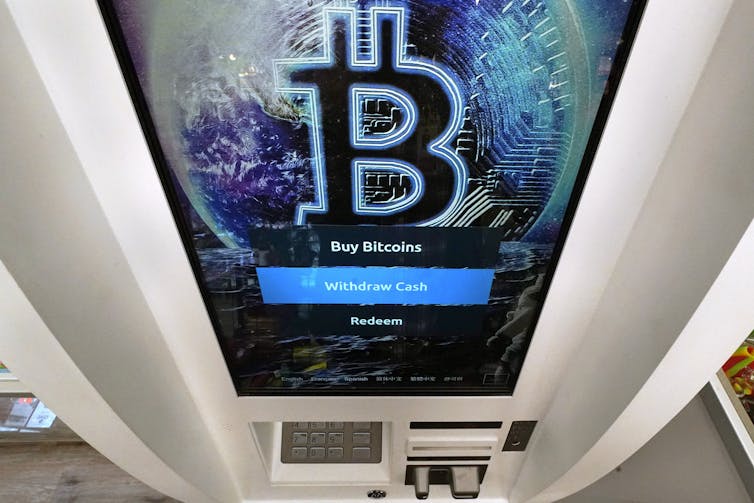What is decentralized finance? An expert on bitcoins and blockchains explains the risks and rewards of DeFi
- Written by Kevin Werbach, Professor of Legal Studies and Business Ethics, University of Pennsylvania
Fervent proponents of cryptocurrencies and the blockchains[1] they run on have promised a lot.
To them, these technologies represent salvation from corporate power over the internet[2], government intrusions on liberty[3], poverty[4] and virtually everything else that ails society.
But so far, the reality has mostly involved financial speculation[5] with popular cryptocurrencies like bitcoin and dogecoin, which soar and plunge[6] with alarming regularity.
So what are cryptocurrencies and blockchain good for?
As an expert on emerging technologies[7], I believe that decentralized finance, known as DeFi, is the first solid answer to that question. DeFi refers to financial services[8] that operate entirely on blockchain networks, rather than through intermediaries like banks.
But DeFi comes with a host of risks as well that developers and regulators will need to address before it can go mainstream.
What is DeFi?
Traditionally, if you want to borrow US$10,000, you first need some assets or money already in the bank as collateral.
A bank employee reviews your finances, and the lender sets an interest rate for the repayment of your loan. The bank gives you the money out of its pool of deposits, collects your interest payments and can seize your collateral if you fail to repay.
Everything depends on the bank: It sits in the middle of the process and controls your money.
The same is true of stock trading, asset management, insurance and basically every form of financial services today. Even when a financial technology app such as Chime[9], Affirm[10] or Robinhood[11] automates the process, banks still occupy the same intermediary role. That raises the cost of credit and limits borrower flexibility[12].
DeFi turns this arrangement on its head[13] by re-conceiving of financial services as decentralized software applications that operate without ever taking custody of user funds.
Want a loan? You can get one instantly by simply putting cryptocurrency up as collateral. This creates a “smart contract[14]” that finds your money from other people who made a pool of funds available on the blockchain. No bank loan officer necessary[15].
Everything runs on so-called stablecoins[16], which are currencylike tokens typically pegged to the U.S. dollar to avoid the volatility of bitcoin and other cryptocurrencies. And transactions settle automatically on a blockchain[17] – essentially a digital ledger of transactions that is distributed across a network of computers – rather than through a bank or other middleman taking a cut.
 Bitcoin can be used as collateral to borrow money using DeFi.
AP Photo/Charles Krupa[18]
Bitcoin can be used as collateral to borrow money using DeFi.
AP Photo/Charles Krupa[18]
The rewards
Transactions made this way can be more efficient, flexible[19], secure[20] and automated than in traditional finance.
Moreover, DeFi eliminates the distinction between ordinary customers and wealthy individuals or institutions, who have access to many more financial products[21]. Anyone can join a DeFi loan pool and lend money to others. The risk is greater than with a bond fund or certificate of deposit, but so are the potential returns[22].
And that’s just the beginning. Because DeFi services run on open-source software code, they can be combined and modified in almost endless ways. For example, they can automatically switch your funds among different collateral pools based on which currently offers the best returns for your investment profile. As a result, the rapid innovation seen in e-commerce and social media[23] could become the norm in traditionally staid financial services.
These benefits help explain why DeFi growth has been meteoric. At the recent market peak in May 2021, over $80 billion[24] worth of cryptocurrencies were locked in DeFi contracts, up from less than $1 billion a year earlier. The total value of the market was $69 billion as of Aug. 3, 2021.
That’s just a drop in the bucket of the $20 trillion[25] global financial sector, which suggests there is plenty of room for more growth.
At the moment, users are mostly experienced cryptocurrency traders, not yet the novice investors who have flocked to platforms like Robinhood[26]. Even among cryptocurrency holders[27], just 1% have tried DeFi[28].
[Over 109,000 readers rely on The Conversation’s newsletter to understand the world. Sign up today[29].]
 Treasury Secretary Janet Yellen and other policymakers are considering ways to regulate decentralized finance.
AP Photo/Virginia Mayo[30]
Treasury Secretary Janet Yellen and other policymakers are considering ways to regulate decentralized finance.
AP Photo/Virginia Mayo[30]
The risks
While I believe the potential of DeFi is exciting, there are also serious causes for concern.
Blockchains can’t eliminate the risks inherent in investing[31], which are the necessary corollary of the potential for returns. In this case, DeFi can magnify the already high volatility[32] of cryptocurrencies. Many DeFi services facilitate leverage, in which investors essentially borrow money to magnify their gains but face greater risk of losses.
Moreover, there isn’t any banker or regulator who can send back funds transferred in error. Nor is there necessarily someone to repay investors when hackers find a vulnerability in the smart contracts or other aspects of a DeFi service. Almost $300 million[33] has been stolen in the past two years. The primary protection against unexpected losses is the warning “investor beware,” which has never proved sufficient in finance[34].
Some DeFi services appear to violate regulatory obligations[35] in the United States and other jurisdictions, such as not barring transactions by terrorists, or allowing any member of the general public to invest in restricted assets like derivatives. It’s not even clear how some of those requirements even could be enforced in DeFi[36] without traditional intermediaries.
Even highly mature, highly regulated traditional financial markets experience shocks and crashes because of hidden risks, as the world saw in 2008[37] when the global economy nearly melted down because of one obscure corner of Wall Street. DeFi makes it easier than ever to create hidden interconnections that have the potential to blow up spectacularly.
Regulators in the U.S. and elsewhere are increasingly talking about ways to rein in these risks. For example, they are starting to push DeFi services to comply[38] with anti-money laundering requirements and considering regulations governing stablecoins[39].
But so far they have only begun to scratch the surface of what may be required[40].
From travel agents to car salespeople, the internet has repeatedly undermined the bottleneck power of intermediaries[41]. DeFi is another example of how software based on open standards can potentially change the game in a dramatic way. However, developers and regulators will both need to up their own performance to realize the potential of this new financial ecosystem.
References
- ^ cryptocurrencies and the blockchains (theconversation.com)
- ^ corporate power over the internet (www.usv.com)
- ^ government intrusions on liberty (time.com)
- ^ poverty (foreignpolicy.com)
- ^ financial speculation (www.spglobal.com)
- ^ soar and plunge (www.cnbc.com)
- ^ expert on emerging technologies (scholar.google.com)
- ^ DeFi refers to financial services (theconversation.com)
- ^ Chime (www.chime.com)
- ^ Affirm (www.affirm.com)
- ^ Robinhood (robinhood.com)
- ^ raises the cost of credit and limits borrower flexibility (papers.ssrn.com)
- ^ DeFi turns this arrangement on its head (whr.tn)
- ^ smart contract (files.stlouisfed.org)
- ^ No bank loan officer necessary (mashable.com)
- ^ so-called stablecoins (theconversation.com)
- ^ settle automatically on a blockchain (www.euromoney.com)
- ^ AP Photo/Charles Krupa (newsroom.ap.org)
- ^ more efficient, flexible (www.bitkom.org)
- ^ secure (files.stlouisfed.org)
- ^ who have access to many more financial products (www.brookings.edu)
- ^ so are the potential returns (www.cnbc.com)
- ^ rapid innovation seen in e-commerce and social media (www.protocol.com)
- ^ over $80 billion (defipulse.com)
- ^ $20 trillion (www.globenewswire.com)
- ^ have flocked to platforms like Robinhood (fortune.com)
- ^ cryptocurrency holders (markets.businessinsider.com)
- ^ just 1% have tried DeFi (consensys.net)
- ^ Sign up today (theconversation.com)
- ^ AP Photo/Virginia Mayo (newsroom.ap.org)
- ^ risks inherent in investing (www.finra.org)
- ^ already high volatility (www.investopedia.com)
- ^ Almost $300 million (finance.yahoo.com)
- ^ has never proved sufficient in finance (www.nytimes.com)
- ^ appear to violate regulatory obligations (www.ft.com)
- ^ could be enforced in DeFi (www.theregreview.org)
- ^ as the world saw in 2008 (www.doi.org)
- ^ push DeFi services to comply (www.coindesk.com)
- ^ considering regulations governing stablecoins (www.wsj.com)
- ^ surface of what may be required (www.weforum.org)
- ^ bottleneck power of intermediaries (www.amazon.com)
















